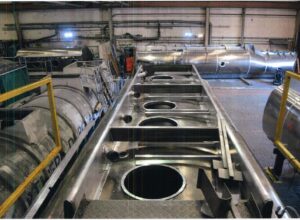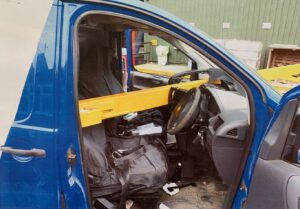November 2023 – A roundup of HSE’s top stories
In November we published more Health and Safety Executive (HSE) stories than any other month this year. They include the prosecution of a major movie production company following an incident on the set Fast and Furious 9, a £1.4 million fine for a cider maker following the tragic death of a grandad, and the publication of our annual ill health and injury statistics. Our Working Minds campaign also launched a new online learning tool designed to prevent work-related stress – businesses are encouraged to give it a go.
Rogue plumber handed suspended prison sentence
A man from St Helens was given a suspended prison sentence for carrying out illegal gas work in Cheshire. Richard Goldthorpe, who has previously spent time behind bars for committing similar offences, was also exposed on BBC’s Rogue Traders TV programme.
He was given a 32-week prison sentence, suspended for a period of 12 months.
You can read the full press release here: Rogue plumber handed suspended prison sentence | HSE Media Centre.

Manufacturing company fined half-a-million pounds after forklift truck death
The mother of a man killed when the forklift truck he was driving overturned said she still feels angry as he ‘simply went to work and didn’t come home.’
Father of one Jamie Anderson was killed on 4 June 2019, when the forklift truck he was operating overturned at a depot in Newark. Barcode Warehouse Ltd was fined £500,000 after pleading guilty to health and safety failures.
New online learning tool helps businesses address work-related stress
On 8 November, a new learning tool to help businesses prevent work-related stress was launched. The free-to-use interactive tool designed by HSE’s Working Minds campaign, aims to provide a better understanding of what needs to be done to comply with the law.
You can read more about the launch here: New online learning tool helps businesses address work-related stress | HSE Media Centre
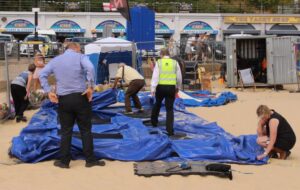
Manager jailed and funfair company fined after three-year-old girl dies
An operations manager at a funfair company was jailed for six months and disqualified as a director for five years after a three-year-old girl died on a Norfolk beach. The funfair company he was working for has been fined £20,000. It followed the tragic death of Ava-May Littleboy, who had been playing on an inflatable trampoline when it exploded, ejecting her high into the air.
You can read the full story here: Manager jailed and funfair company fined after three-year-old girl dies | HSE Media Centre

Priory Healthcare fined following patient death
The company that runs The Priory Hospital was fined after it failed to ensure the safety of patients on the hospital’s Emerald Ward following the death of 21-year-old Francesca Whyatt.
Francesca, from Knutsford in Cheshire, was found unconscious at The Priory Hospital in Roehampton, London. She died three days later.
The company was fined £140,000 following a HSE investigation.
You can read the full press release here: Priory Healthcare fined following patient death | HSE Media Centre
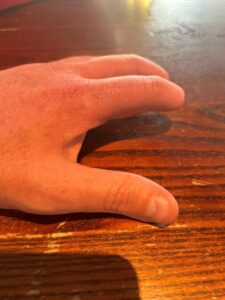
McCain Foods fined after employee loses fingers
A frozen food giant was hit with a £700,000 after an employee lost two of his fingers following an incident at a factory in Lincolnshire.
Tom Matthews, from Grantham, is now a health and safety champion in his current job at a different company, warning others to avoid his misfortune.
He had been working a night shift at McCain Foods’ site in Easton on 2 September 2019 when he suffered serious injuries to his left hand.
You can read the full story about this here: McCain Foods fined after employee loses fingers | HSE Media Centre
HSE publishes annual work-related ill health and injury statistics for 2022/23
On 22 November, we published the annual statistics on work-related ill health and workplace injuries.
The statistics show that nearly two million workers in Great Britain reported as suffering from work-related ill health – with around half of those being down to stress and anxiety.
You can read more on the statistics here: HSE publishes annual work-related ill health and injury statistics for 2022/23 | HSE Media Centre

Mother’s grief after only son killed while working for major egg supplier
A mother spoke about her grief after her only child was killed while working at ‘Sunrise Eggs’ in Loughborough.
Nineteen-year-old Ben Spencer had only been working for Sunrise Poultry Farms for two weeks when he was crushed between a heavy goods vehicle (HGV) and a wall on 12 April 2021.
His mum Tracy says she would like nothing more but to ‘curl up in a ball’ after his death at the site in Sileby.
You can read more here: Mother’s grief after only son killed while working for major egg supplier | HSE Media Centre
Entertainment company fined after worker dies from fall
A company in the entertainment industry was fined £16,000 following the death of a worker.
Russell Bowry, a self-employed rigger, was working at ELP Broadcast and Events Ltd’s Cardington Hangar Studios in Bedfordshire when he fell from height on 13 March 2018.
The 52-year-old, from Lower Stondon, Bedfordshire, was part of an assembly team for a project that required the building of a temporary rehearsal stage.
You can read the full press release here: Entertainment company fined after worker dies from fall | HSE Media Centre

Farmer fined after cow attack left man fearing for his life
A retired chartered surveyor said he feared for his life after being attacked by cows while walking his dog on a public footpath in Devon.
The farmer responsible was prosecuted by HSE as a result.
Mr Atherton, a 70-year-old had been walking with his dog on its lead when they were set upon by around seven cows on 12 June 2022.
You can read the full press release here: Farmer fined after cow attack left man fearing for his life | HSE Media Centre
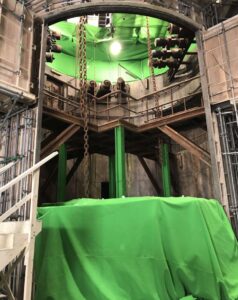
Company fined as stunt performer sustains life-changing injuries during filming of Fast and Furious movie
A production company was fined after a stunt performer was injured during the filming of Fast and Furious 9: The Fast Saga.
Joe Watts, from Surrey, sustained life-changing injuries after he fell approximately 25 feet at Warner Bros. studios in Leavesden, Hertfordshire on 22 July 2019.
He had been filming a fight scene for the action movie.
You can read more on this release here: Company fined as stunt performer sustains life-changing injuries during filming of Fast and Furious movie | HSE Media Centre

Lift maintenance company fined after engineer fatally crushed
A lift maintenance company was fined after an employee died while working at a factory run by Muller Yogurt and Desserts.
Lift Monitoring Systems Limited, previously known as RJ Lift Services Limited, was fined £200,000 on Monday following a HSE investigation into the death of 24-year-old Lewis McFarlin, a lift engineer employed by the Staffordshire company.
The full story is available here: Lift maintenance company fined after engineer fatally crushed | HSE Media Centre
Cold weather working: Helping workers stay safe and warm
Employers were reminded of their responsibilities to keep workers safe as the first spell of cold weather hit large parts of the country during the last few days of November.
We stresses the importance of protecting workers during the cold weather as the Met Office issued yellow and amber weather warnings for ice and snow.
You can read more on the release here: Cold weather working: Helping workers stay safe and warm | HSE Media Centre

Man “lucky to be alive” after incident at luxury yacht maker in Plymouth
A premium yacht maker was fined £600,000 after one of its workers suffered life changing injuries at its shipyard in Plymouth.
Mark Gillen’s wife Sarah said she is lucky to still have her husband around after he sustained a catalogue of injuries, including 12 broken ribs and a severed right arm, when a staging platform weighing approximately one tonne, toppled over and fell on top of him.
You can read the full story here: Man “lucky to be alive” after incident at luxury yacht maker in Plymouth | HSE Media Centre
Firms fined over £600k after dad dies from fall
A further two companies have been fined after a dad died following a fall from the roof of a building site in Warrington.
Father-of-one Dennis Vincent, 36, and another worker were using ropes to install a lightning protection system to the front of an office block being converted into flats.
You can read more about this press release here: Firms fined over £600k after dad dies from fall | HSE Media Centre
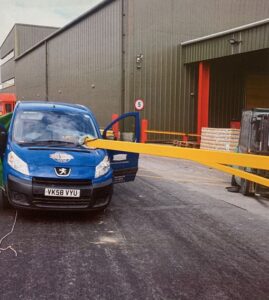
Renowned cider manufacturer fined following grandad’s death
The maker of Henry Westons Cider was fined £1.4 million after a much-loved grandfather was killed on his 65th birthday. Tommy Manns, from Dymock, Gloucestershire, was driving a company van when he was killed by the end of a security barrier on 28 September 2020.
The van was being driven out of the firm’s site at Bounds Farm, March Marcle, Ledbury, when the end of a security barrier speared through the vehicle’s windshield and fatally crushed Tommy.
The full press release can be read here: Renowned cider manufacturer fined following grandad’s death | HSE Media Centre
